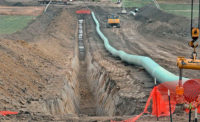Feds Halt Dakota Pipeline Project in Wake of Growing Controversy
Union officials and workers describe intensifying demonstrations at the Bakken Field transmission site

A protestor chained himself to a piece of heavy equipment at the jobsite in central North Dakota on Aug. 31.
Photo by Tom Stromme/The Bismarck Tribune via AP
After months of legal wrangling and escalating protests over development of the Dakota Access Pipeline, three federal agencies on Sept. 9 temporarily halted construction along a 20-mile section of the route in North Dakota.
In a joint statement, the U.S. Depts. of Justice, Army and Interior said the Army will not authorize construction of the pipeline on Corps land bordering or under Lake Oahe in North Dakota until the Army can determine whether it will need to reconsider any previous decisions under the National Environmental Policy Act or other federal laws.
Lake Oahe is a reservoir along the Missouri River. “The Army will move expeditiously to make this determination, as everyone involved—including the pipeline company and its workers—deserves a clear and timely resolution,” the statement reads. Energy Transfer Partners did not release an official statement about the rulings but stated in a memo to employees that it remains committed to completing the project, which is nearly 60% finished, according to the Associated Press.
In a Sept. 9 statement, Dave Archambault II, chairman of the Standing Rock Sioux Tribe, said, “The Obama administration has asked tribes to the table to make sure that we have meaningful consultation on infrastructure projects. Native peoples have suffered generations of broken promises, and today the federal government said that national reform is needed to better ensure that tribes have a voice on infrastructure projects like this pipeline.”
Archambault’s statement quickly followed a ruling earlier the same day from U.S. District Judge James Boasberg that construction of the project could continue despite objections from the tribe. In his opinion on Standing Rock Sioux Tribe v. U.S. Army Corps of Engineers, Judge Boasberg said the Corps had “likely complied” with the National Historic Preservation Act (NHPA) and that the tribe “has not shown it will suffer injury that would be prevented by any injunction the court could issue.”
Energy Transfer Partners is developing the $3.8-billion, 1,172-mile, 30-in.-dia pipeline to transport up to 570,000 barrels of crude oil per day to Patoka, Ill., from the Bakken production areas in northwestern North Dakota. In July, the tribe filed a complaint in federal court alleging that the project would threaten its environmental and economic well-being. The complaint also alleges the project would “damage and destroy sites of great historic, religious, and cultural significance to the Tribe,” thus triggering the NHPA. Although the project route does not cross the Standing Rock reservation, it crosses nearby, thereby putting its lands at risk, the tribe said.
The tribe has filed an appeal and a request for an injunction with the U.S. Circuit Court of Appeals for the District of Columbia.
The recent rulings came after weeks of escalating protests over the project’s construction near the Standing Rock reservation. Some protesters have entered pipeline right-of-way requests, attached themselves to construction equipment and defaced machinery. The combination of ongoing protests and work stoppages has had a chilling effect on pipeline construction workers, construction union representatives say. “Pipeline workers are a traveling show,” says Glen Johnson, business manager of Operating Engineers Local 49 in West Fargo, N.D. “They are here to work and make a living. If they aren’t working and they aren’t making money, they will move on to another job.”
Johnson says that, under its labor agreement, crews that are asked to stand down will still be compensated, but “they won’t get as many hours as if they had worked.” Recent developments also have hampered recruiting efforts, he says. Actions by protestors have struck fear into some workers, Johnson adds. “Three of our guys were on the job and … saw dozens of protesters coming toward them,” he says. “They didn’t know what might happen, so they crawled through a fence and ran.”
Kevin Pranis, Great Lakes Region marketing manager for the Laborers International Union of North America, says in the lead-up to the court decision, there were “militant actions to shut down the right-of-way.” He says protesters have “swarmed” right-of-way sections and chained themselves to pieces of equipment. “It’s an increasingly tense environment,” he says. “People are scared by the tactics and trying to figure out if they are personally at risk.”
Protesters also have aired complaints about security tactics at disputed construction sites. Videos have circulated in the media of a private security firm using dogs and pepper spray to deter protesters at a construction site on Sept. 3. North Dakota Gov. Jack Dalrymple (R) has since activated the state National Guard to help monitor disputed construction sites.
Jim McManigle, a steward with Teamsters Local 346, says his crews are working on the opposite side of the Missouri River from the disputed areas and have not seen any protests. Still, his crews have not been able to start work on the Missouri River bore, which would connect to those areas.
The administration’s decision to halt work on the project’s Lake Oahe sections also has raised questions about larger considerations beyond the Dakota Access Pipeline project. The administration plans to invite tribal leaders to meet in Washington, D.C., to discuss the possibility of potential new legislation as well as how the government could help tribes to provide more meaningful input regarding infrastructure projects on tribal lands.
“The administration listened to the tribes and said, ‘Let’s rethink this process,’ ” says Doug Hayes, staff attorney with the Sierra Club. “It’s less clear what it means for the rest of the pipeline.


